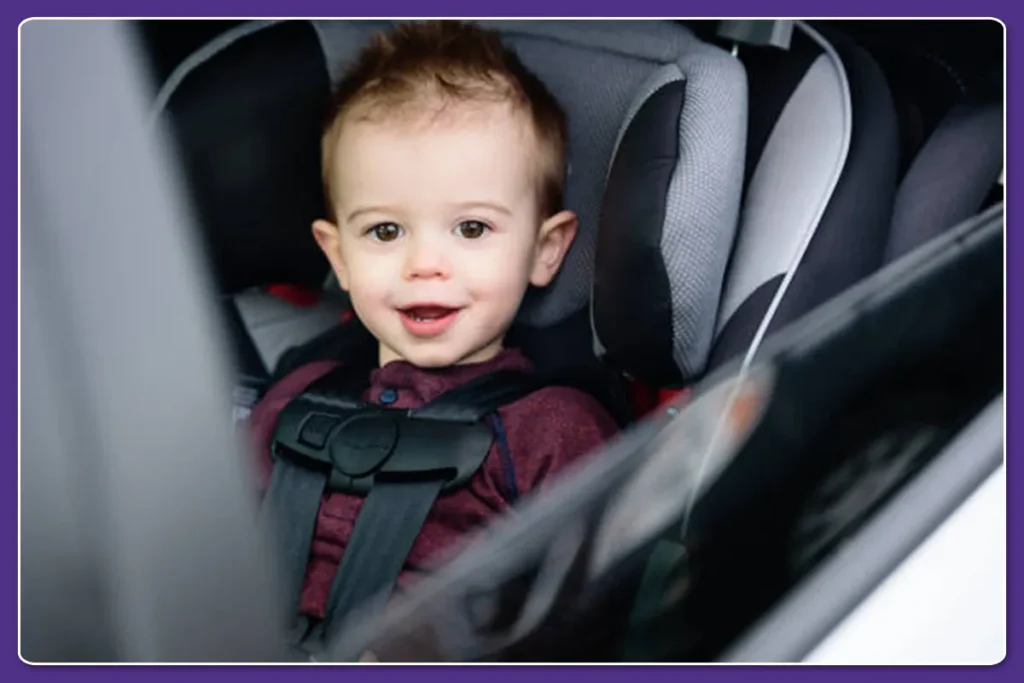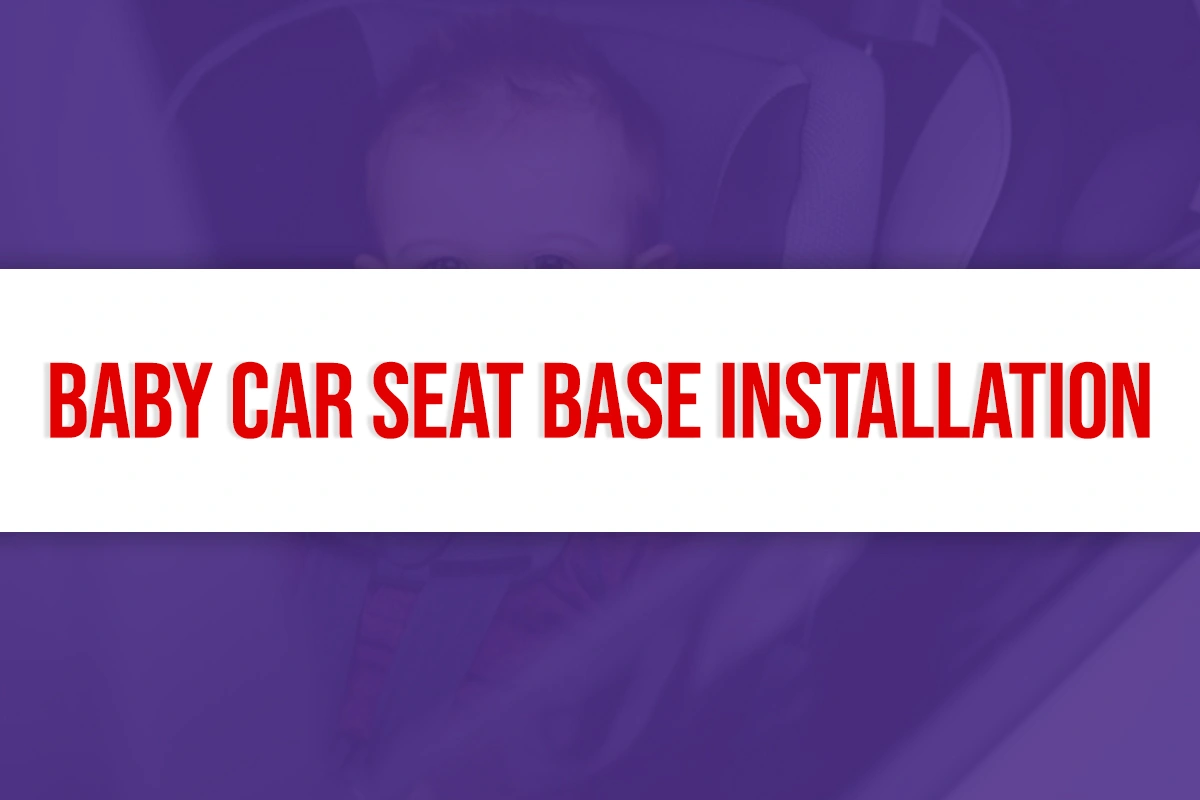Installing a baby car seat base can be challenging for new parents. Ensuring the safety of your little one is crucial.
In this guide, we will walk you through the essentials of baby car seat base installation. Proper installation is vital for your child’s safety during car rides. With so many models and instructions, it can get confusing. Our step-by-step guide will help simplify the process.
We’ll cover common mistakes to avoid and provide tips for a secure fit. By the end of this post, you will feel confident in installing your baby car seat base correctly. Let’s make your car rides safer and stress-free.

Importance Of Proper Installation
Installing a baby car seat base correctly is crucial. It ensures your child’s safety during car rides. Proper installation reduces the risk of injury in accidents. It also keeps the seat secure in sudden stops.
Safety Benefits
A properly installed car seat base provides maximum protection. It keeps the car seat stable and secure. This stability helps in preventing the seat from moving or tipping over.
Proper installation also ensures that the car seat functions as designed. In an accident, the seat absorbs the impact, protecting your child. This can save lives and prevent serious injuries.
Common Risks
Improper installation poses several risks. The car seat may not be secure, increasing the chance of injury. In accidents, an improperly installed seat can detach from the base.
Common mistakes include using the wrong belt path or not tightening the seat enough. These errors compromise the seat’s safety. Always follow the manufacturer’s instructions.
Types Of Car Seat Bases
Choosing the right car seat base is crucial for your baby’s safety. There are different types of car seat bases. Each type offers unique features. Understanding these can help you make the right choice.
Infant Car Seat Bases
Infant car seat bases are designed for newborns and small babies. These bases are usually used with rear-facing seats. They provide maximum protection for your baby.
- Easy Installation: Most infant bases use a latch system. This makes installation simple and secure.
- Portability: Infant car seats can be detached from the base. This allows you to carry your baby without removing them from the seat.
- Adjustable Angles: Many infant bases offer angle adjustments. This ensures your baby is in a safe and comfortable position.
Infant car seat bases are often compatible with strollers. This combination is convenient for busy parents.
Convertible Car Seat Bases
Convertible car seat bases grow with your child. They can be used rear-facing and forward-facing. This makes them versatile and cost-effective.
- Longevity: Convertible bases can be used for several years. They adjust to your child’s growth, making them a long-term solution.
- Flexibility: These bases can switch from rear-facing to forward-facing. This allows for continued use as your child grows.
- Enhanced Safety: Convertible bases often come with additional safety features. These features include side-impact protection and energy-absorbing materials.
Convertible car seat bases offer great value. They eliminate the need for multiple car seats as your child grows.
| Type | Best For | Key Features |
|---|---|---|
| Infant Car Seat Bases | Newborns and small babies | Easy installation, portability, adjustable angles |
| Convertible Car Seat Bases | Growing children | Longevity, flexibility, enhanced safety |
Understanding the types of car seat bases can help you make an informed decision. Choose the one that best fits your baby’s needs and your lifestyle.
Choosing The Right Base
Selecting the right baby car seat base is crucial for your child’s safety. A well-chosen base ensures the car seat fits securely. This helps to protect your baby. There are several factors to consider. Below, we discuss some important aspects.
Compatibility With Car
First, ensure the car seat base is compatible with your car. Check the manufacturer’s guidelines. They often provide a list of compatible vehicles. Look for a base that fits well in your car model.
You can also visit the store and try fitting the base in your car. This gives you a clear idea of how it fits. If possible, ask for a demonstration. This helps you understand the installation process better.
Ease Of Use
Ease of use is another critical factor. A user-friendly base makes installation simpler. Look for bases with clear instructions. Colored indicators can be very helpful. They show whether the base is installed correctly.
Some bases come with an easy-click system. This allows you to attach and detach the car seat with ease. Check for adjustable features. This ensures the base can be adjusted to fit securely.
For additional convenience, look for a lightweight base. This makes it easier to move between vehicles. Also, consider bases that are easy to clean. Babies can be messy, so this feature can be a lifesaver.
| Feature | Importance |
|---|---|
| Compatibility with Car | High |
| Ease of Use | High |
| Adjustable Features | Medium |
| Lightweight | Medium |
| Easy to Clean | Low |
Pre-installation Checks
Ensuring your baby car seat base is installed correctly is crucial for your child’s safety. Pre-installation checks are essential steps that guarantee the base fits securely and functions properly. These checks help in avoiding any future mishaps and ensure a smooth installation process.
Reading The Manual
Begin by reading the manual provided with the car seat base. The manual contains important details specific to your model. It guides you through the proper installation steps and safety guidelines. Take your time to understand each instruction. This will help avoid any mistakes during the installation process. If you have any doubts, consult the manual again.
Inspecting The Base
Before installation, inspect the base for any signs of damage. Check for cracks, missing parts, or anything unusual. Ensure all components are present and in good condition. If you find any issues, contact the manufacturer. A damaged base can compromise your child’s safety. Make sure the base is clean and free from debris.
These pre-installation checks ensure that the car seat base is ready for a secure fit. They play a vital role in keeping your child safe during travel.
Step-by-step Installation Guide
Installing a baby car seat base can feel like a big task. But with a clear step-by-step guide, it becomes simple. This guide will help you through the process. Let’s get started!
Preparing The Car
First, make sure your car is ready. Park on a flat surface. This ensures stability.
- Read your car’s manual. Find the section on car seat installation.
- Clear the area where you will install the base. Remove any items that might get in the way.
Now you are ready to move on to securing the base.
Securing The Base
It’s crucial to place the base correctly. Follow these steps for a secure fit:
- Position the base on the car seat. Make sure it is flat and snug.
- Check the recline angle. Some bases have an indicator to help with this.
- Use the seat belt or LATCH system to secure the base. Refer to your car and seat manuals for guidance.
Always check for a tight fit. The base should not move more than one inch side-to-side or front-to-back.
By following these steps, you ensure your baby travels safely. Happy driving!
Ensuring A Secure Fit
Ensuring a secure fit for your baby’s car seat base is crucial for safety. A properly installed car seat base reduces the risk of injury during accidents. Follow these steps to ensure a snug and secure installation.
Tightness Test
After installing the car seat base, perform a tightness test. Try to move the base side-to-side and front-to-back. It should not move more than an inch in any direction. If it moves more, tighten the straps or latches. This test ensures the base is firmly secured to the car seat.
Angle Adjustment
Check the angle of the car seat base. Most bases have a level indicator. This helps you set the correct angle. The base should be level to the ground. Adjust the angle using the built-in adjustment feature. A correct angle ensures your baby’s head stays in a safe position.
Using Latch System
Installing a baby car seat base can be a daunting task. The LATCH system makes this process easier and more secure. LATCH stands for Lower Anchors and Tethers for Children. This system helps to secure the car seat base without using the vehicle’s seat belt. Below, we will explore the benefits and installation steps of the LATCH system.
Latch Benefits
The LATCH system provides several key benefits:
- Enhanced safety: It ensures a tighter fit, reducing the risk of injury.
- Ease of use: The system is simple to install, even for beginners.
- Universal compatibility: Most vehicles and car seats come with LATCH anchors.
Latch Installation Steps
Follow these steps for a secure installation:
- Locate the anchors: Find the lower anchors in your vehicle seat. They are usually between the seat cushions.
- Attach the connectors: Connect the car seat’s lower anchor connectors to the vehicle anchors. Ensure they click into place.
- Check for tightness: Press down firmly on the car seat base. It should not move more than an inch side-to-side or front-to-back.
- Attach the tether: Connect the top tether to the designated anchor point. This helps to prevent the seat from tipping forward.
- Double-check everything: Make sure all connections are secure. The seat should be stable and properly aligned.
By following these steps, you can ensure the safety and comfort of your child. The LATCH system is designed to make car seat installation straightforward and reliable.
Post-installation Tips
You’ve successfully installed your baby car seat base. But the journey doesn’t stop there. Ensuring the safety of your child requires regular upkeep and mindfulness during travel. Here are some essential post-installation tips to keep your baby safe and comfortable on the road.
Regular Inspections
Performing regular inspections is crucial. Check the car seat base for any signs of wear and tear. Look for loose parts or damaged components.
- Weekly checks: Ensure the base is securely attached to the car seat.
- Monthly checks: Inspect the entire car seat for any cracks or broken parts.
- Before each trip: Double-check the harness and straps for proper fit.
Keeping a routine inspection schedule helps catch potential issues early. This ensures your child remains safe at all times.
Travel Tips
Traveling with your baby can be challenging. Here are some tips to make it easier:
- Plan ahead: Map out your route and schedule breaks.
- Pack essentials: Bring extra diapers, wipes, and snacks.
- Secure loose items: Store toys and bags in the trunk or secure them.
- Use sunshades: Protect your baby from direct sunlight.
These tips help ensure a smoother and safer travel experience for you and your baby.
Frequently Asked Questions
To install a baby car seat base, follow the manufacturer’s instructions. Secure the base using the vehicle’s seat belt or LATCH system. Ensure the base is tightly fixed and does not move more than an inch.
No, baby car seat bases are not universal. Different car seats require specific bases designed for that model. Always check compatibility before purchasing.
Yes, you can install a car seat base without LATCH. Use the vehicle’s seat belt to secure the base. Follow the manufacturer’s instructions for proper installation.
A car seat base should be tightly secured. It should not move more than one inch in any direction. Ensure it is properly installed to keep your baby safe.
Conclusion
Installing a baby car seat base correctly is crucial for safety. Follow the manufacturer’s instructions closely. Double-check all connections and ensure a snug fit. Regularly inspect the base for any wear or damage. Remember, your child’s safety depends on proper installation.
Taking these steps helps keep your baby safe on every journey. Drive with peace of mind, knowing you’ve secured your precious cargo properly. Your diligence makes a big difference. Keep your little one safe and enjoy every ride together.







